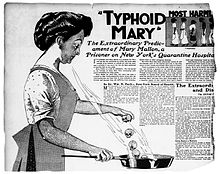インデックス・ケース (英語 : index case )は、疫学 調査上で集団内最初の患者となった人物を指す言葉である[ 1] [ 2] プライマリー・ケース (primary case)、ペイシェント・ゼロ (patient zero)も同様の意味である。日本語では「初発症例 」「発端症例 」[ 3] [ 注釈 1]
インデックス・ケースという語は、この他、遺伝学 では原因と目される遺伝要因を家族内で調査するきっかけを作った最初の発症者(発端者、英: propositus / proband )を指したり[ 4] 前頭葉 に大きな損傷を負いながら生還したフィニアス・ゲージ の一例など、文献上「古典的な」位置づけを得ることもある。
「プライマリー・ケース」という語は、ヒト=ヒト感染を起こす感染症 にのみ用いられ、この病気を集団内へ最初に持ち込んだ人物のことを指す[ 5]
インデックス・ケースからは、病気の出所や考えられる伝染状況、アウトブレイク 中に病気に感染していたリザーバーが誰かなど、さまざまな情報を得られる可能性がある。また、アウトブレイクのきっかけとなった最初期の感染例でもあり、第1・第2・第3(英: primary, secondary, tertiary, etc. )とナンバリングされることもある[ 15]
ロンドン大学衛生熱帯医学大学院 の感染症疫学者であるデイヴィッド・ヘイマンは、インデックス・ケース(ペイシェント・ゼロ)を見つける意義について問われ、「ペイシェント・ゼロを見つけることが重要な例もあるが、それは患者がまだ生きていて病気を蔓延させている時に限る。大概の場合、特に病気の大きなアウトブレイクの場合、そういうことは必要無い」と述べている[ 16]
現在は誤りと立証されている1984年の論文から引いた図[ 17] 赤 でハイライトされた円が初めてAIDSの症状を呈した人物と目された。 AIDS 流行の最初期、アメリカ疾病予防管理センター (CDC) のウィリアム・ダロウ (英語版 ) [ 18] ガエタン・デュガ (英語版 ) ヨーロッパ からアメリカ へウイルスを持ち込んだキャリアで、別の男性へ感染を広げたと特定した[ 19] ヒト免疫不全ウイルス (HIV) を複数のパートナーへ感染させたか、そして彼らがさらに別人に感染させ、このウイルスがどれだけのスピードで全世界に広がったかを示すものだった (Auerbach et al., 1984)。
ジャーナリストのランディ・シルツ (英語版 ) [ 18] そしてエイズは蔓延した (英語版 ) ピューリッツァー賞 を受賞し、後に『運命の瞬間/そしてエイズは蔓延した 』として映画化された。[ 20] [ 21] 客室乗務員 だったデュガは北アメリカの複数の都市の有料発展場 で乱交 を行っていたという。デュガはゲイ 男性間のHIV感染を広めた人物として広く知られ、「マス・スプレッダー 」(英: "mass spreader" )として中傷された。4年後、ダロウは研究のメソッドと、シルツが結論に至った過程を批判するに至った[ 18]
2007年に投稿された論文では、遺伝子解析に基づき、現在北アメリカで流行しているHIVの系列は、アフリカ からハイチ を辿って1969年頃にアメリカへ入ったものと推定され[ 22] [ 23] 移民 だったと結論付けられている。しかしながら、ミズーリ州 セントルイス でAIDS合併症により1969年に死亡したロバート・レイフォード (英語版 ) [ 24] [ 25] [ 26]
チフスのメアリーについて報じた当時の記事 メトロポール・ホテル9階の見取り図。緑の箇所に宿泊した男性からアウトブレイクが発生した。 2009年に起きた新型インフルエンザの世界的流行 では、エドゥガル・エンリケ・エルナンデス(スペイン語: Édgar Enrique Hernández )がペイシェント・ゼロと考えられており[ 33] [ 34] Maria Adela Gutierrez )が、公式に確認された最初の死者である。
「ペイシェント・ゼロ」の語は、ネットワークであるマルウェア に初めて感染し、その後他のシステムへ感染を広げたコンピュータ・ユーザを指して使われることがある[ 9] [ 36]
モニカ・ルインスキー は、インターネット上で大勢からの嫌がらせ を受けた最初の人物だとして、自身を「ペイシェント・ゼロ」と表現した[ 37]
1993年の映画『ゼロ・ペイシェンス 』は、AIDSの「ペイシェント・ゼロ」の汚名を着せられた人物が死者の国から戻ってくるというミュージカル映画。
映画『アウトブレイク 』では、インデックス・ケース探しが物語の大筋となっている。映画『コンテイジョン 』では、グウィネス・パルトロー 演じるエリザベス・エンホフが、登場する致死性ウイルスMEV-1のインデックス・ケースとなる。
スマートフォン・ゲーム『Plague inc. 』では、プレイヤーの作ったウイルスについて情報を集めるため、CDCにペイシェント・ゼロを探させることができる。ゲーム『Prototype 』では、主人公のアレックス・マーサーが、研究所で開発されたウイルスのペイシェント・ゼロとなってしまう。
^ 「初発」の語は、癌や食物アレルギーなどの症例で「(ある人が)ある病気を初めて発症した」という意味(「再発」の対語)で使われることもあるので区別すること。
^ “Diseases – Activity 1 – Glossary, page 3 of 5 ”. science.education.nih.gov. 2010年11月3日 閲覧。 ^ “WordNet Search – 3.0 ”. Princeton University, wordnetweb.princeton.edu. 3 November 2010 閲覧。 ^ 小西友七 ; 南出康世 (25 April 2001). "index case". ジーニアス英和大辞典 . ジーニアス . 東京都 文京区 : 大修館書店 (published 2011). ISBN 978-4469041316 OCLC 47909428 . NCID BA51576491 . ASIN 4469041319 . 全国書誌番号 :20398458 。^ “Definition of index case ”. The free medical dictionary by farlex. 2017年9月27日 閲覧。 ^ Giesecke, Johan. “Primary and index cases” . The Lancet 384 (9959). doi :10.1016/s0140-6736(14)62331-x . https://doi.org/10.1016/S0140-6736(14)62331-X . ^ Davis, Nicola (27 October 2016). “Gaétan Dugas: 'patient zero' not source of HIV/Aids outbreak, study confirms ”. The Guardian . 2017年9月27日 閲覧。 ^ “Patient Zero – definition of Patient Zero in the Medical dictionary – by the Free Online Medical Dictionary, Thesaurus and Encyclopedia ”. medical-dictionary.thefreedictionary.com. 3 November 2010 閲覧。 ^ “飛沫感染/接触感染、平成29年度全国労働衛生週間講話 ”. 2019年12月25日 閲覧。 ^ a b “Search for patient zero: uncovering malware infection at the source” . Infosecurity Magazine . (10 July 2012). https://www.infosecurity-magazine.com/news/search-for-patient-zero-uncovering-malware/ 31 March 2017 閲覧
^ “Have Doctors Found Swine "Patient Zero?"” . CBS News . (2009年4月29日). http://www.cbsnews.com/stories/2009/04/29/earlyshow/main4976805.shtml ^ “Researchers trawl for Conficker's 'Patient Zero' – Techworld.com ”. news.techworld.com. 2010年11月3日 閲覧。 ^ “Patient Zero ”. TV.com (2006年3月20日). 2010年11月3日 閲覧。 ^ Lemos, Robert. “Witty worm traced to 'Patient Zero' ”. The Register. 2017年9月27日 閲覧。 ^ “That Man in the White House ”. The Weekly Standard (28 November 2003). 3 November 2010 閲覧。 ^ “Sporadic STEC O157 Infection: Secondary Household Transmission in Wales ”. Centers for Disease Control and Prevention, USA, www.cdc.gov (1 January 1994). 3 November 2010 閲覧。 ^ Mohammadi, Dara (2015-01-15). “Finding patient zero” . The Pharmaceutical Journal 294 (7845). http://www.pharmaceutical-journal.com/news-and-analysis/features/finding-patient-zero/20067543.article 2015年1月16日 閲覧 ^ Auerbach, D.M.; W.W. Darrow; H.W. Jaffe; J.W. Curran (1984). “Cluster of cases of the acquired immune deficiency syndrome. Patients linked by sexual contact”. The American Journal of Medicine (英語版 ) 76 (3): 487–92. doi :10.1016/0002-9343(84)90668-5 . PMID 6608269 . ^ a b c “The Origin of HIV and the First Cases of AIDS ”. AVERT, www.avert.org. 2010年11月3日 閲覧。
^ Pence, G. E. (2008). Preventing the Global Spread of AIDS. In Medical Ethics Accounts of the Cases That Shaped and Define Medical Ethics (p. 331). New York, USA, McGraw-Hill.
^ “遺伝:HIVがニューヨーク市に上陸した時期ブックマーク ”. ネイチャー (2016年10月27日). 2017年9月27日 閲覧。 ^ 宮田一雄 (2005-06-04). “AIDSと報道―ゆるやかに拡大する危機にどう対応するか” . 医学のあゆみ 213 (10). http://www.jcie.org/japan/j/pdf/fgfj/07/c06.pdf 2017年9月27日 閲覧。 ^ Bowdler, Neil (2007年10月30日). “Key HIV strain 'came from Haiti'” . BBC News . http://news.bbc.co.uk/2/hi/health/7068574.stm 2010年5月5日 閲覧。 ^ 原論文:Gilbert MT, Rambaut A, Wlasiuk G, Spira TJ, Pitchenik AE, Worobey M. (2007 Nov 20). “The emergence of HIV/AIDS in the Americas and beyond.” . Proc Natl Acad Sci U S A. 104 (47): 18566-70. doi :10.1073/pnas.0705329104 . PMC 2141817 . PMID 17978186 . https://www.ncbi.nlm.nih.gov/pmc/articles/PMC2141817/ 2017年9月27日 閲覧。
^ Ben Andrew Henry (October 26, 2016). “HIV Spread from Haiti to NYC in 1970, “Patient Zero” Not to Blame ”. The Scientist. 2017年9月27日 閲覧。 ^ Worobey, Michael et al (2016). “1970s and 'Patient 0' HIV-1 genomes illuminate early HIV/AIDS history in North America”. Nature doi :10.1038/nature19827 . ^ HOOD, Marlowe (2016年10月27日). “「ペイシェント・ゼロ」、米エイズ流行の起源ではないと証明 研究 ”. AFP通信 . 2017年9月27日 閲覧。 ^ “Molecular Interventions – CLOCKSS ”. 14 October 2014 閲覧。 ^ “NOVA | The Most Dangerous Woman in America | In Her Own Words ”. PBS (1938年11月11日). 2010年11月3日 閲覧。 ^ Marr, J. (1999-05-15). “Typhoid Mary.”. The Lancet 353 (9165): 1714. doi :10.1016/S0140-6736(05)77031-8 . PMID 10335825 . ^ “How SARS changed the world in less than six months” . Bulletin of the World Health Organization (英語版 ) 81 (8). (2003). http://www.scielosp.org/pdf/bwho/v81n8/v81n8a14.pdf . ^ Laurance, Jeremy (2003年4月24日). “One family went on holiday – and made Toronto a global pariah” . The Independent . https://www.independent.co.uk/news/science/one-family-went-on-holiday--and-made-toronto-a-global-pariah-595492.html 2010年5月5日 閲覧。 ^ 国立感染症研究所 感染症情報センター(訳) (2003年12月26日). “WHO/CDS/CSR/GAR/2003.11 - 重症急性呼吸器症候群(SARS)の疫学に関する統一見解文書 ” (PDF). 2017年9月26日 閲覧。^ “Have Doctors Found Swine "Patient Zero?" ”. CBS News (2009年4月29日). 2010年11月3日 閲覧。 ^ “Statue erected of first boy in world who caught swine flu ”. Mirror, www.mirror.co.uk . 2009年4月25日 閲覧。 ^ “Finding Ebola's 'patient zero' ”. The Guardian 28 November 2014 閲覧。 ^ Savitz, Eric (5 June 2012). “Finding Patient Zero: The Key To Responding To Malware Attacks” . Forbes . https://www.forbes.com/sites/ericsavitz/2012/06/05/finding-patient-zero-the-key-to-responding-to-malware-attacks/#1aace8ecf390 31 March 2017 閲覧 ^ Merica, Dan (October 21, 2014). “Lewinsky makes emotional plea to end cyberbullying” . CNN . https://edition.cnn.com/2014/10/20/politics/lewinsky-cyber-bullying/index.html October 22, 2014 閲覧。


